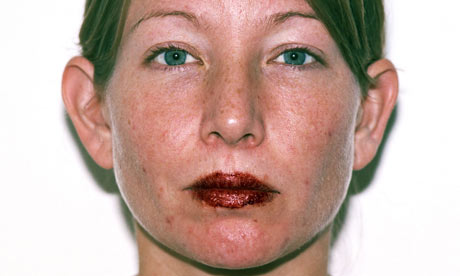160 comments plus another 120 plus another 39 and still they post...
MENSTRUAL ACTIVISM has hit a nerve!
On Friday, The Guardian published a story on menstrual activism which featured a photograph of a woman with *menstrual blood* on her lips (a piece by artist Ingrid Berthon-Moine). And there was a complementary article published in the same issue (an honest first person narrative about shifting menstrual attitudes).
Both articles generated a lot of comments–much of them negatively focused on the photograph. Liz Kissling responded with a great retort on this blog.
Then on Monday, following up on The Guardian piece, writer Amanda Fortini argued on Salon.com’s Broadsheet that the menstrual taboo is a thing of the past.
..shock, panic, fingerpointing (those stupid feminists are barking up the wrong tree), namecalling (I think someone actually called me, by association, “Professor of the Faculty of Useless Studies”) disgust (eeeewwwwww), outrage…..the gamut.
There were stretchy analogies (as in, that’s a STREEEEEETCH (see: excremental activism)), tragic anecdotes run amok (since I am cool with my period, that means EVERYONE ELSE is) and plenty of superficial “we’ve come a long way, baby” analyses that seemed forged in a vacuum, and more.
There were also plenty of folks keeping it real and making darn good arguments confirming the menstrual taboo’s persistent hold and why we should care. If you are one of those posters reading this post right now—thanks for speaking up!
There’s more than a denial of the taboo in the Broadsheet piece; there is also a dismissal of the seriousness and value of the work of challenging the menstrual status quo. We clearly need to educate a LOT of people of the importance of looking at menstruation as a key issue in its own right AND as a window into the patriarchal (and capitalist) shaming and controlling of women’s bodies.
The need for the blog is surely affirmed by the response to these three pieces.
Here’s the letter I wrote to Salon/Broadsheet today.
____________________
Menstruation is a biological reality.
How we respond to it is a tangled web of social constructions that tell us a lot about what it means to be a woman in our culture.
When I began studying menstrual activism 6 years ago, that’s what piqued my interest, but I wasn’t long in the field before I discovered something the menstrual activists have always known.
Menstrual activism is part of a complex and enduring project of loosening the social control of women’s bodies, of working to move women’s bodies from object to subject status—something absolutely foundational to taking on a host of feminist issues, from human trafficking to eating disorders to sexual assault.
It may not be obvious at first (and, hmmmm, might that be because we are socialized to not look too closely “down there”?) but menstrual activists, whether using humor or shock or the promotion of scholarly research, reveal how women internalize destructive messages about womanhood including notions of our bodies as messy, unruly things (yes, things) that need to be tidied up, medicated, plucked, smoothed and trimmed. This exhausting (and expensive) quest for the perfect body replaces the search for good quality information about how the body works and how to keep it healthy and strong.
Menstrual activism critiques the gendered commodification of the body (and this applies to everyone, not only biological women), and leads us to ask some tough questions about what we take for granted. What can we learn about our cultural value systems when we examine “quiet wrappers so your period stays private,” skin lightening creams (the fairer, the better) and steroid abuse among teen boys? Who benefits from these values-in-practice? Who suffers?
Menstrual activism has been working on this frontier since at least the 1960s and I, for one, am grateful. They are used to the kind of reactive denial and distortion expressed here and to Cochrane’s piece in The Guardian–such responses to their work inspire them to press on. Their focus on the personal and (what is considered) the private lends us tremendous insight into how gender works and that is time well spent for any feminist.
____________________
Amen.



I couldn’t let this one lie, either. Interested readers can find my response to Amanda Fortini’s Broadsheet and her readers here.